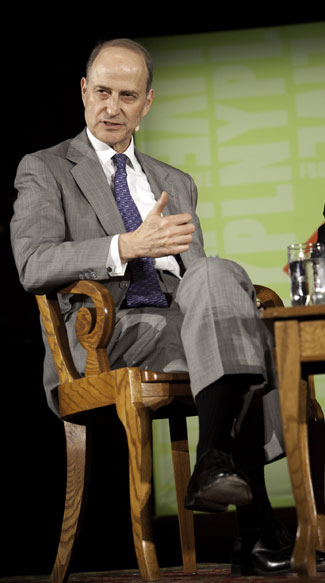NYPL Prez: Libraries Are Here to Stay
 “I don’t have any patience for people who think libraries are going to become an anachronism any time soon,” New York Public Library president Paul LeClerc (right) said towards the end of a discussion with Bruno Racine of France’s Bibliothèque Nationale held at the NYPL’s Celeste Bartos Forum last week. “If there’s any sort of organization that’s deeply entrenched in American life, it’s libraries.” LeClerc had already spoken eloquently about libraries as “places that help build human capital” and emphasized the important role libraries can play in times of economic hardship: “A lot of our patrons can no longer afford to buy books. They don’t have wireless access at home.” The library was as much an anchor for the community, he noted, as a place for scholarly research.
“I don’t have any patience for people who think libraries are going to become an anachronism any time soon,” New York Public Library president Paul LeClerc (right) said towards the end of a discussion with Bruno Racine of France’s Bibliothèque Nationale held at the NYPL’s Celeste Bartos Forum last week. “If there’s any sort of organization that’s deeply entrenched in American life, it’s libraries.” LeClerc had already spoken eloquently about libraries as “places that help build human capital” and emphasized the important role libraries can play in times of economic hardship: “A lot of our patrons can no longer afford to buy books. They don’t have wireless access at home.” The library was as much an anchor for the community, he noted, as a place for scholarly research.
But when it came to scholarly research, he was very enthusiastic about the impact of the Google Books program, to which the NYPL had contributed 300,000 scanned public domain volumes. “If your books are put online,” he said, “they will be used more often, and maybe more deeply, than they ever were before.” And he rejected the notion that putting these books online would cut into the publishing industry’s revenues. “Our purpose at the New York Public Library is to let people have access to our material,” he said forcefully. “Physically and, when we can, online. We drew—not a line, but a trench, in the sand, when it came to copyright, and we’ve never even approached the edge of that trench.”
One key issue moving forward, then, is making the library a more attractive place for scholars and writers to be at when as researching remotely online becomes easier. “My sense is that we should let everyone who’s going to be here with us for an extended amount of time… make their presence known,” LeClerc said, brainstorming scenarios where visiting researchers could use social media tools to see who else in their field was also around, forming impromptu communities online or at the library itself. It’s not the one thing that will either make or break any library’s future, but his ideas do point towards the welcome opportunities for any large library to become not just a repository for knowledge but an engine for generating new knowledge, too.
photo: Jori Klein
5 May 2011 | uncategorized |
Amelie Nothomb: From Tokyo to Manhattan
“Japan is perhaps the most important country of my life,” Amélie Nothomb said, sitting in a sidewalk café shortly before the opening ceremonies of the PEN World Voices Festival last week. She was born in Japan (her parents were Belgian diplomats) and lived there until she was five, but those early experiences stayed with her as the family moved to China, the United States, and on to several other nations: “I kept saying that I was Japanese, that one day I would go back to my country.” In 1989, at the age of twenty-one, she got her chance. “Two years later, I escaped after a professional catastrophe and a love disaster,” she continued; she wrote about her work experience in an autobiographical novel called Fear and Trembling published in 1999, but it wasn’t until 2007 that she published the book which was eventually translated into English as Tokyo Fiancée.
“I think it’s much more difficult to write about happiness than to write about any other subject,” Nothomb explained, “so I needed almost twenty years to be able to talk about it.” It took her far less time to digest the humiliation she endured at her job, where she’d eventually been assigned a position as a washroom attendant, than the good times she had with Rinri, a young man who originally hired her as a private French tutor. The scenes from their relationship in Tokyo Fiancée don’t always seem happy—his parents can be insufferably condescending; he invites all his friends to meet her, then vanishes into the kitchen and makes her fend for herself conversationally—and finally she realizes that he’s serious about wanting to marry her and she’s just as serious about not wanting to marry him. Still, she puts off telling him no because, as she writes, “to refuse would have meant breaking up, something I did not want.” She does enjoy his company, after all, and it’s only when the pressure to marry becomes too stifling that she flees to her sister’s house in Belgium.
4 May 2011 | interviews |

 Our Endless and Proper Work is my new book with Belt Publishing about starting (and sticking to) a productive writing practice.
Our Endless and Proper Work is my new book with Belt Publishing about starting (and sticking to) a productive writing practice. 
